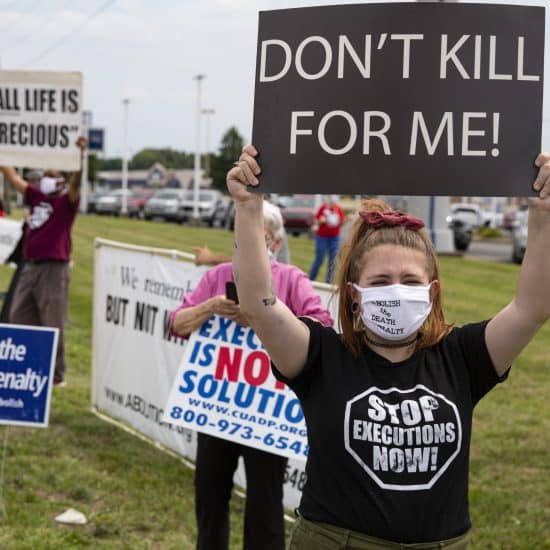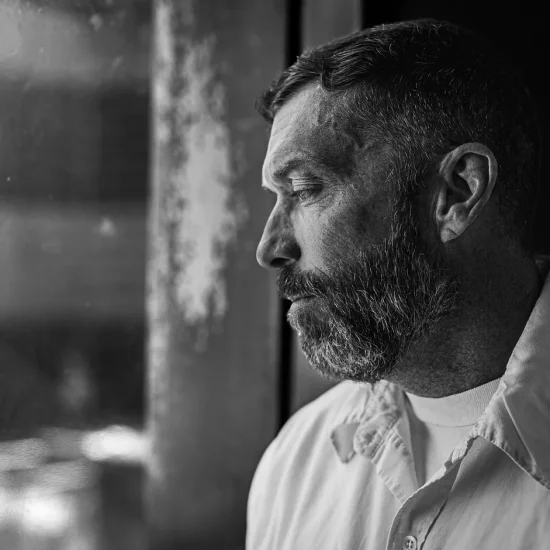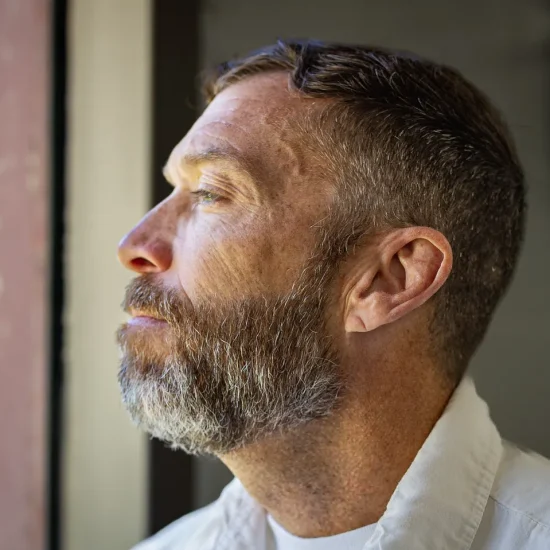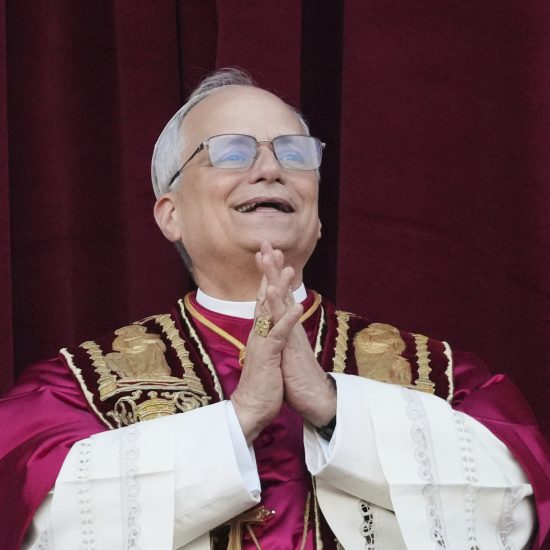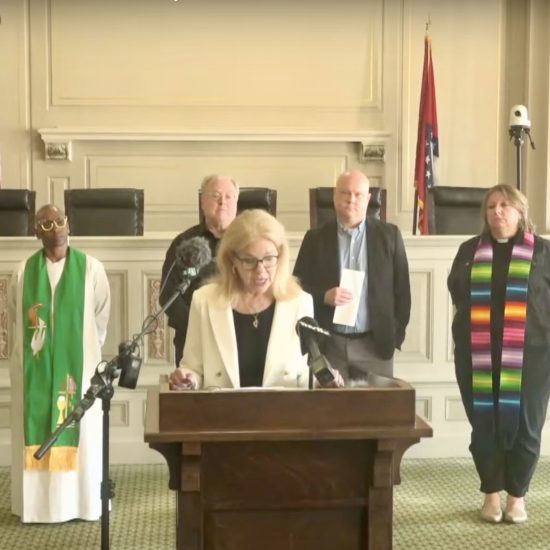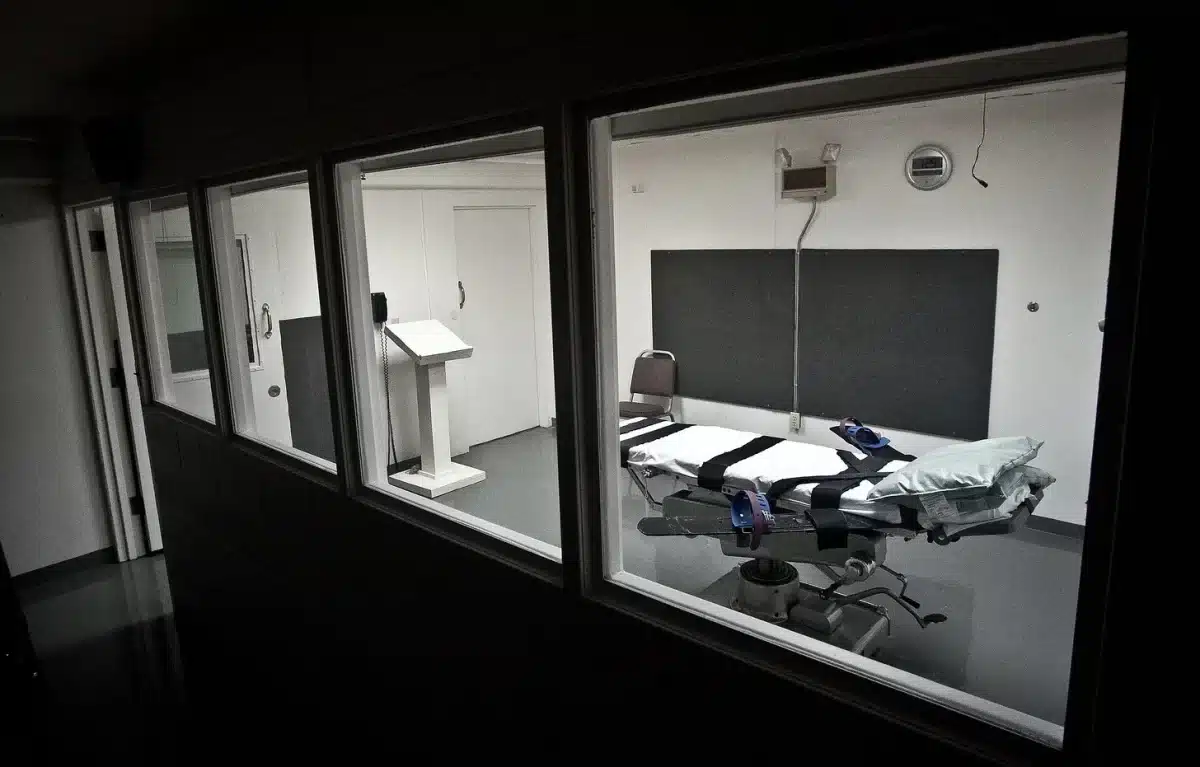
Rev. Lauren Bennett recently prayed as she held the hand of someone dying. That’s not an unusual pastoral care moment. But this time felt different. She prayed while sitting in an execution chamber as the state of Missouri killed the person next to her.
Executed on Jan. 3 for the murder of Beverly Guenther, Amber McLaughlin was the first of four people nationwide subjected to the death penalty so far in 2023.
“I’ve never come into someone’s life at the end of their life in that way,” Bennett told me. “Amber was a fully alive person. She was so full of life.”
“When I’ve been with other people close to their death — even if I didn’t know them long — there’s been a different kind of peace. Often of a life lived, even if cut short by disease,” Bennett added. “This felt different because it’s not like Amber was sick or had some other reason that she was going to die; she was being killed.”
As Missouri’s secret drugs flowed into McLaughlin’s veins, Bennett touched and prayed for McLaughlin, feeling McLaughlin’s heart beating and then stopping. In the weeks that preceded that last rite, Bennett had studied the Bible with McLaughlin, talked about God and prayed together, and even baptized McLaughlin and shared communion.
Now, the associate pastor at Metropolitan Community Church of Greater St. Louis is part of a small group of ministers who have been allowed into death chambers in recent months to touch and pray for people being executed.
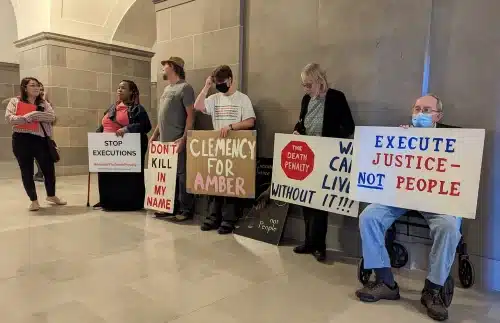
A vigil by Missourians to Abolish the Death Penalty outside of Gov. Mike Parson’s office in the state Capitol in Jefferson City, Missouri, on Jan. 3, 2022, a few hours before Amber McLaughlin’s execution. (Brian Kaylor/Word&Way)
In 2021, John Henry Ramirez, who was on death row in Texas, sued after state officials refused his request for his pastor to lay hands on him during his execution. While states allowed chaplains and other ministers to be present, the clergy were generally required to stand quietly away from the condemned person. Just three hours before Ramirez was to die, the U.S. Supreme Court blocked the execution to hear his case.
In March of 2022, the justices ruled 8-1 that Texas could not bar Ramirez’s Southern Baptist pastor from touching him and offering an audible prayer during the lethal injection. So on Oct. 5, Rev. Dana Moore stood in the death chamber and prayed as the state killed a man he had ministered to behind bars for five years.
A few other spiritual advisors have similarly offered such intimate pastoral care since then. Stephen Barbee had a spiritual advisor present with him during his Nov. 16 execution in Texas.
Rev. Darryl Gray, a Progressive National Baptist pastor in St. Louis, held Kevin Johnson’s shoulder and prayed on Nov. 29, making him the first spiritual advisor in Missouri to be by the side of a condemned person during an execution. On the day Bennett walked into that death chamber just over a month later to pray for McLaughlin, Gray called to talk and pray for her — which Bennett said “was kind and generous.”
In the month since McLaughlin’s execution, all three executions in the nation saw spiritual advisors in the chamber. That included executions in Texas of Robert Fratta on Jan. 10 and Wesley Ruiz on Feb. 1. And Rev. Jeff Hood stood by Scott Eizember as he was executed by Oklahoma on Jan. 12 (although the state initially said they would not allow Hood in the chamber because he had previously been arrested during a peaceful anti-death penalty protest in Texas).
As Missouri plans another execution next week — in a case where the accused, Raheem Taylor, insists he’s innocent — Bennett’s story offers a look inside the execution chamber from the only person who wasn’t there that day to make sure McLaughlin died. And as she ministered deep in the valley of prison until the shadow of death passed over, she found herself wrestling with the nature of God and humanity.
Advent on Death Row
While traveling to visit family for Thanksgiving, Bennett received a text from a local community organizer about the possibility of serving as McLaughlin’s spiritual advisor. With an execution date looming, McLaughlin expressed a desire for spiritual care.
But finding a spiritual advisor could be more difficult than for other people on death row because McLaughlin was a trans woman. Bennett could be a good fit since, as she put it, Metropolitan Community Church where she serves is “a progressive queer-centered church.” That was part of what brought her to faith at a different MCC church before she went to seminary and started working at MCC in St. Louis.
Willing to consider serving as a spiritual advisor, Bennett talked with McLaughlin the next Monday. It was just a little over a month from McLaughlin’s execution date, and it was the second day of Advent.
“Amber was looking for someone who could help her get closer to God, talk to her about the nature of God, and help her find some peace,” Bennett said. “I felt like that was something that I could do, so it felt like the right thing to say ‘yes’ to.”
Many of their conversations during the next few weeks were over the phone. They could also email through the prison’s monitored messaging system. At the start of a week, Bennett would email times she was available so that McLaughlin could find times to call.
Bennett also made several visits to the prison, which was about an hour and a half away. But she had to work with prison officials — and juggle her busy Christmas schedule at church — for those in-person meetings, most of which occurred as they spoke on phones and looked at each other through glass.
Once or twice a week, Bennett made the journey to the prison to visit McLaughlin. Bennett said a couple in her church “made this their ministry too” by being there for her. One of them would drive her to the prison and two hours later take her back so she wouldn’t be alone and could process the experience with someone. Bennett said they too were changed by this experience as they helped her in “a grounded, deeply spiritual, witnessing, and holding way.”
On Sundays, the church prayed for McLaughlin, but many in the congregation didn’t know their associate pastor was quietly living out the call in Matthew 25 to visit her in prison.
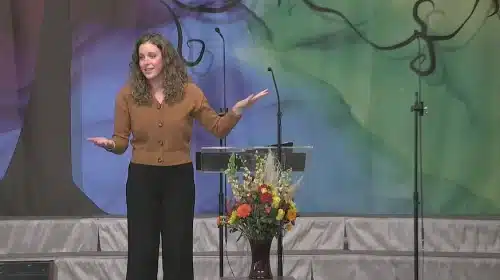
Screengrab as Rev. Lauren Bennett preaches at Metropolitan Community Church of Greater St. Louis on Nov. 13, 2022.
As Bennett trekked in and out of the prison, she found herself switching between life and death. The church had decorated for Advent, and Christmas lights and decorations filled the city streets. She struggled with this disconnect between enjoying the joyful season and thinking about the upcoming execution.
“I was struggling a lot with just feeling like everything was ‘the last’ for Amber. I was feeling a lot of sadness,” Bennett said. “But Amber was really excited to get to know me and to get to know other people, largely trans women who had come into her life in her last months.”
“And she loves Christmas. She loves glitter and sparkle,” Bennett added. “And she loved Christmas music. So I had to get over my own feelings and really try to be there for her and her feelings. Because, of course, it was sad. I don’t want to minimize that. But she was in a different place than I was in a lot of ways. She wanted to hear about what did our Christmas tree look like, and she wanted to hear about what we were doing at church for Christmas. … It just was meaningful too that she wanted to know and she wanted to be a part of the joy of the season through our family.”
Bennett finds herself inspired by someone being “so strong and brave really in the face of her death.” As the pastor experienced these different worlds during Advent, it also impacted her thinking about the holy season.
“There’s so much there that goes with the season of Advent and this season of Epiphany that reminds us who we’re supposed to be as Christians. These seasons invite us to fully embrace where we are, be present in the moment, and know that though things are not always going to be easy, we can find the grace and the love of the moment anyway,” Bennett said. “I learned a lot of that from Amber in that time. I’d drive to the prison sad, and often I would leave those visits with her joyful. Not what I expected.”
During their first phone call, McLaughlin expressed a desire to be baptized, so Bennett said they would discuss that more in person. A couple of weeks later — about halfway through Advent — Bennett showed up for the baptism. It was the first time they met outside of the visiting room with its glass dividers. They hugged, the first of three times they would touch. The second time would be briefly for a photo on Christmas Eve. The third would come with McLaughlin strapped down on the gurney.
Bennett explained that on the day of the baptism service, they went into the recreational area with the chapel, which she called “a cinderblock room that has very little religious iconography” since “the prison is a multifaith environment.” At first there were others in the area, but they waited to baptize McLaughlin until everyone else went back to their cells to be counted so it could be a more private moment.
Bennett said someone she thinks was an incarcerated person who worked in the chapel had brought water in a basin like one used to collect dirty dishes in a cafeteria.
“He had warmed up the water and he was very concerned about the water being the right temperature,” she said. “He was like, ‘Oh, what do you think? Is it too hot, too cold?’ It was very touching.”
They sang a song, and then Bennett sprinkled McLaughlin, prayed over her, and anointed her with oil.
“It was very intimate. It was just her and I, the chaplain, and one of the guards,” Bennett noted. “It was lovely. It was really a perfect, simple, powerful baptism.”
Help sustain the ministry of Word&Way by subscribing to A Public Witness!
The Tenth Day of Christmas
On Jan. 3, amid the famed “12 days of Christmas,” Missouri executed McLaughlin. Bennett spent much of the day inside the prison.
She arrived at the state prison in Bonne Terre that morning to be McLaughlin’s last in-person visit. Unlike times when they talked across desks and through phones in the visitor’s area, this time the visit was in the holding cell area. Although still separated by glass, Bennett said it felt different since “our knees, were almost touching.”
“We were both so close to the glass. And there was a point where we were praying together and our foreheads were almost touching with just the glass in between us,” she added. “At the very end of that visit, we were holding our hands to the glass and crying together.”
“It was such a gift to spend that time with her,” Bennett added.
For two hours they talked. McLaughlin shared about phone calls and emails from people, particularly enjoying photos people had sent of their Christmas trees and decorations. And McLaughlin wanted to read scripture together.
“She was really concerned that she might be judged for being a transgender woman. And so in previous visits, we had gone through some of those passages that are often used against trans people in general. That day, we revisited some of her favorite unlearnings,” Bennett said. “And then she wanted to talk about what heaven would be like.”
As they read scriptures like John’s vision of heaven in Revelation 21 and talked about what they thought it could mean, McLaughlin was painting her nails through a process of wetting colored pencils to create the pink polish — the same color that activists who urged clemency for McLaughlin wore at protests. Bennett recalled that McLaughlin said she “might recognize God as a cloud,” especially “a fluffy cloud, like on a nice summer day.”
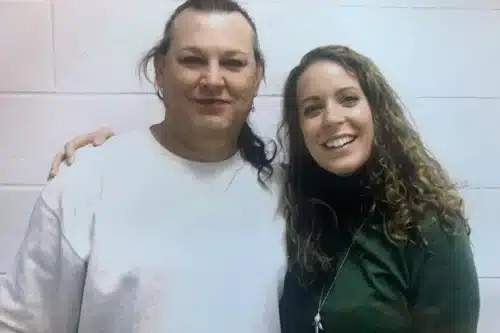
Amber McLaughlin and Lauren Bennett on Christmas Eve, Dec. 24, 2022.
Meanwhile, the large clock above them kept ticking — “the clock was like a bomb,” Bennett said. With about 10 minutes left before Bennett had to leave, “we both took a deep breath” and then decided to do communion. McLaughlin had some peanut butter cookies, so they used those.
“That’s what Jesus did,” Bennett said with a chuckle. “Just did communion with the things that were there.”
“We shared communion with those peanut butter cookies and ate together and prayed together,” she added. “We ended our time by really just holding our hands up toward each other [on the glass] and crying. It felt to me like a mix of tears of gratitude and tears of sadness.”
After the visit at McLaughlin’s cell, Bennett had to leave and wait outside until closer to the execution later that day. So she met some other people nearby at a bar since “there was nowhere else to go really.” She found it “weird” to sit there processing what was happening with “people eating lunch and having a normal Tuesday.”
When Bennett returned to the prison, she had to wait and then wait longer due to a delay, leaving her “pacing” and wondering what was going on during that “excruciating” time. By the time she was allowed into the death chamber, McLaughlin was strapped down.
She had a few minutes to speak to McLaughlin, perhaps 10 minutes, but the passage of time in her memories from that evening remains a blur. McLaughlin shared about more phone calls received in the hours since the two last spoke. And Bennett told McLaughlin of what she’d seen outside just before reentering the prison for the execution: “There was this pink halo of clouds at sunset.”
The curtains to the witness areas opened. Soon the lethal drugs started to flow into McLaughlin’s veins as Bennett held McLaughlin’s hand. According to news reports, McLaughlin’s last words were: “I am sorry for what I did. I am a loving and caring person.” But Bennett heard a few more as the lethal injection started: “Ouch, ouch, ouch, it hurts.”
“After she looked at her witness box, she was making eye contact with me the rest of the time,” Bennett said. “So I prayed for her. That’s what she wanted.”
“She took three deep breaths, more like snores, and then she was unconscious. I was holding her hand and touching her shoulder, and I could feel her heartbeat [in her hand],” Bennett added. “I felt her heart beating and then starting to become more faint. Soon after that, she turned blue. A couple of minutes after that they closed the curtains. And, again, I don’t know if it’s minutes or seconds really — it felt like hours — but then I had a minute to myself with her before I was ushered out of the room.”
After sitting in a nearby room for a few minutes, the shock wore off and Bennett cried, her “tears billowing out.” Then she walked out of the prison.
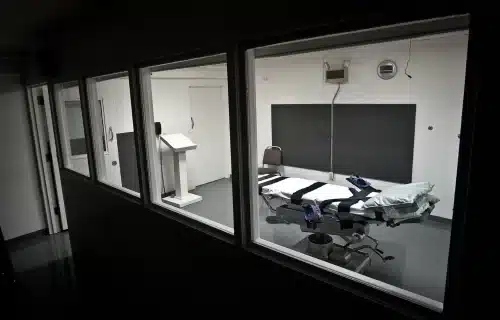
Death chamber in Oklahoma. (Josh Rushing/Creative Commons)
Get cutting-edge reporting and analysis like this in your inbox every week by subscribing today!
Killing People is Wrong
After the execution, Bennett found it difficult to sleep. She continues to process the experience and reflect in new ways about how “capital punishment is completely vile.” She particularly finds it morally problematic since many people on death row have intellectual impairments or experienced childhood neglect or trauma before making terrible choices. Like McLaughlin, who was exposed to alcohol in the womb and experienced significant abuse from her adoptive father.
“We throw people away and treat them like garbage and monsters,” she said. “It diminishes who we are as humanity. Amber did a terrible thing and she was sorry for it. She really was. And she was a completely different person when she died than when she committed the crime that put her in prison.”
“I wholeheartedly believe in a God that gives us second and third chances. And there’s evidence of that all throughout scripture — that’s where our authority is,” Bennett added. “It doesn’t make any sense to meet violence with violence. Holly Near has that song where it says, ‘Why do we kill people who are killing people to show that killing people is wrong?’”
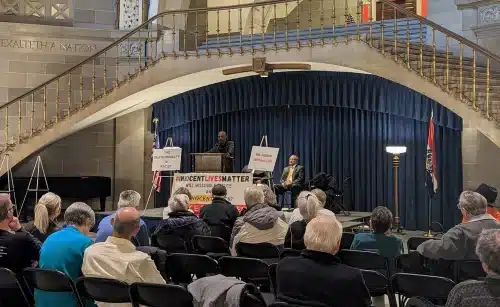
Joe Amrine, who was exonerated after spending 17 years on death row in Missouri, speaks at a rally against the death penalty on Jan. 31, 2022, in the state Capitol in Jefferson City, Missouri. (Brian Kaylor/Word&Way)
Ten days after the execution, Bennett gathered with friends for a vigil on what would have been McLaughlin’s 50th birthday. It was also Bennett’s birthday — one of what Bennett called those “little moments where God was connecting us.” Among the last things McLaughlin had said to Bennett was to “celebrate our birthday and celebrate it good.”
So before going out for pizza, she joined a group to hold a vigil for McLaughlin in the Transgender Memorial Garden of St. Louis. They sang songs, prayed, shared stories about McLaughlin, and placed pink Gerbera daisies around the garden.
They also tried to light candles, but the cold wind kept blowing them out. One of Bennett’s friends remarked it seemed appropriate: “Well, Amber’s light was snuffed out early, so it makes sense that the candles wouldn’t light tonight.”
As a public witness,
Brian Kaylor

